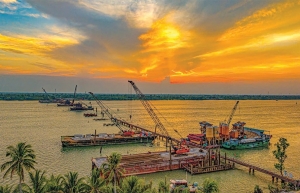The call for a greener future via investment
However, the pressing challenges posed by climate change now call for a reassessment of the country’s industrialisation and urbanisation strategies to mitigate their negative impact on the environment. In this context, a revised national investment policy is essential to steer all projects towards a greener, cleaner future.
 |
| Nguyen Canh Cuong, ex-minister counsellor in Belgium and the United Kingdom |
Vietnam’s current investment policy is designed to foster a favourable environment for both domestic and foreign investors, with a particular focus on manufacturing, technology, and infrastructure. There are a number of key components.
The first is incentives for investment. Tax holidays, reduced corporate income tax rates, and exemptions or reductions in import duties are offered, especially for projects in high-tech, infrastructure, and export-oriented sectors. Preferential land rental rates and extended lease periods are available to investors in prioritised sectors and regions. Additionally, special economic and industrial zones offer attractive incentives, including simplified administrative procedures and favourable tax treatment.
Second is investment in priority sectors. Vietnam prioritises high-tech industries, supporting industries, agriculture, and projects involving tech transfer, aligning with its goals for industrialisation and modernisation.
Thirdly, when it comes to foreign investment regulations, the government has liberalised foreign ownership rules in several sectors, allowing up to 100 per cent foreign ownership in many industries. This aligns with international agreements such as the World Trade Organization and various free trade agreements, contributing to a more transparent and predictable investment climate.
Finally, we must mention sustainable development goals. While Vietnam aims to draw in investment, it also seeks alignment with the United Nations goals. However, current policies targeting green investment are limited in scope and effectiveness.
However, there are also some challenges in promoting green investment. Vietnam’s policies mention sustainable development, but there is no comprehensive framework specifically promoting green investment. The existing incentives are often too generic, lacking differentiation between green and non-green projects. Moreover, regulatory uncertainty, particularly concerning environmental regulations, can deter potential green investors who need long-term clarity. Additionally, there is insufficient support for green technology transfers and innovations.
Vietnam can draw valuable lessons from the European Union and the United Kingdom, which offer comprehensive incentives for green investments. The EU, driven by the European Green Deal, promotes green investments through tax incentives, subsidies, green financing, emissions trading, grants, and strict regulatory standards. Meanwhile, the UK aligns its green incentives with its net-zero emissions target, offering green financing, tax relief, carbon pricing, and support for research and development.
To enhance its green investment policy, Vietnam could consider a number of measures. The country needs to set clear climate targets via the establishment of a national law with binding greenhouse gas emission reduction targets, aiming for specific milestones by 2030, 2040, and net-zero emissions by 2050.
What is more, Vietnam would also need to develop a green transition plan. It is necessary to create a comprehensive national roadmap for green transition, detailing measures for decarbonisation, clean energy, sustainable agriculture, waste management, and pollution reduction, including sector-specific strategies and timelines.
In addition, the government must promote clean energy and efficiency, with a focus placed on expanding renewable energy capacity and improving energy efficiency through targeted incentives, subsidies, and regulatory support. It is also necessary to encourage a circular economy, and Vietnam needs to implement policies that promote recycling, material reuse, and waste reduction, and offer incentives for sustainable production processes.
Other aspects include enhancing sustainable mobility, including incentives for electric vehicles and investment in charging infrastructure; protecting biodiversity and ecosystems, with strong policies to protect natural ecosystems and promote sustainable land use; and boosting the mobilisation of green finance, in which it is necessary to establish a national green investment plan to mobilise public and private funding and develop financial instruments such as green bonds.
Moving forward, the government should formulate and implement a comprehensive green investment framework with an aim to promoting green investments by adopting several key strategies. This includes creating a green investment fund to provide low-interest loans, grants, and equity financing for green projects, particularly in renewable energy, clean transport, sustainable agriculture, and waste management.
The establishment of these dedicated factors will help Vietnam accelerate its transition to a low-carbon, sustainable economy and align with global climate goals.
| Vietnam to launch investment incentives for semiconductor industry Vietnam is set to introduce a robust incentive framework to selectively attract foreign investment into high-tech industries, particularly in the semiconductor and electronics sectors, to be backed by central and local government budgets. |
 | Legal reform could woo foreign investment to pharmaceuticals At VIR's conference on sustainable healthcare on September 25, industry experts delved into the best methods to attract foreign investment to the pharmaceutical sector and how legal reform can create a breakthrough. |
 | Tra Vinh efficient in propelling public investment Leveraging diverse measures, Tra Vinh province has seen inspiring results with public investment disbursement in the year to date, and hopes to achieve more than 95 per cent of the government-assigned plan. |
What the stars mean:
★ Poor ★ ★ Promising ★★★ Good ★★★★ Very good ★★★★★ Exceptional
Related Contents
Latest News
More News
- Hermes joins Long Thanh cargo terminal development (February 04, 2026 | 15:59)
- SCG enhances production and distribution in Vietnam (February 04, 2026 | 08:00)
- UNIVACCO strengthens Asia expansion with Vietnam facility (February 03, 2026 | 08:00)
- Cai Mep Ha Port project wins approval with $1.95bn investment (February 02, 2026 | 16:17)
- Repositioning Vietnam in Asia’s manufacturing race (February 02, 2026 | 16:00)
- Manufacturing growth remains solid in early 2026 (February 02, 2026 | 15:28)
- Navigating venture capital trends across the continent (February 02, 2026 | 14:00)
- Motivations to achieve high growth (February 02, 2026 | 11:00)
- Capacity and regulations among British areas of expertise in IFCs (February 02, 2026 | 09:09)
- Transition underway in German investment across Vietnam (February 02, 2026 | 08:00)

 Tag:
Tag:




















 Mobile Version
Mobile Version